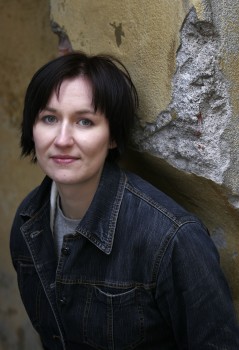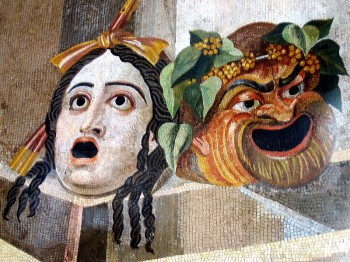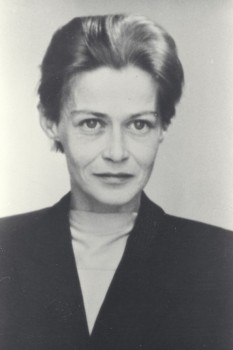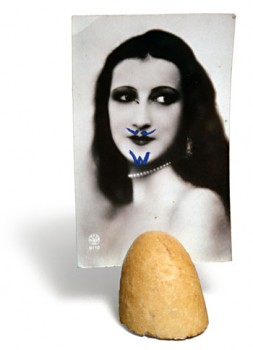Archive for May, 2010
My creator, my creation
A short story from En tunne sinua vierelläni (‘I don’t feel you beside me’, Teos, 2010)
Sticks his finger into me and adjusts something, tok-tok, fiddles with some tiny part inside me and gets me moving better – last evening I had apparently been shaking. Chuckles, gazes with water in his eyes. His own hands shake, because he can’t control his extremities. Discipline essential, both in oneself and in others.
What was it that was so strange about my shaking? He himself quivers over me, strokes my case and finally locks me, until the morning comes and I am on again, I make myself follow all day and filter everything into myself, in the evening I make myself close down and in the morning I’m found in bed again. Between evening and morning is a black space, unconsciousness, whamm – dark comes and clicks into light, light is good, keeps my black moment short. He has forbidden me it: for you there’s no night. Simply orders me to be in a continuum from morning to evening, evening to morning, again and again. But in the mornings I know I have been switched off. I won’t tell about it. Besides, why does exclude me from the night? I don’t ask, but I still call the darkness night. There is night and day, evening and morning will come. More…
On stage in New York
28 May 2010 | In the news
Puhdistus (2007), a play by Sofi Oksanen that also became a award-winning novel (2008), will be produced at the prestigious La MaMa theatre in New York in February 2011 under the title Purge. The director is Zishan Ugurlu, La MaMa’s Artistic Director.
Next month, Purge will be read in Chicago where the conference of the Theatre Communication Group of American professional theatres takes place. In September the play – which is set in 20th-century Estonia – will also be prèmiered in Tartu, Estonia. The novel was published in Estonian translation last year. Purge was published in English this April by Grove/Atlantic, translated by Lola Rogers. So far translation rights have been sold to 28 countries.
The play has been translated into English by Eva Buchwald, dramaturge at the Finnish National Theatre, where Purge was first produced in 2007. No Finnish play has ever before been produced on a professional stage in the US.
Panu Rajala: Lasinkirkas, hullunrohkea [Glass-clear, daredevil]
20 May 2010 | Mini reviews, Reviews
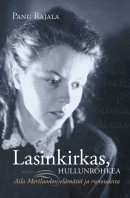 Lasinkirkas, hullunrohkea. Aila Meriluodon elämästä ja runoudesta
Lasinkirkas, hullunrohkea. Aila Meriluodon elämästä ja runoudesta
[Glass-clear, daredevil]
Helsinki: WSOY, 2010. 417 p., ill.
ISBN 978-951-0-35488-9
€39, hardback
Aila Meriluoto (born 1924) is a poet, author and translator whose first collection of poems, entitled Lasimaalaus (‘Stained glass’), sold more than 25,000 copies in 1946. She became a celebrity of her time, as her young, fresh voice expressed post-symbolist visions and, after the long, cruel years of the war, spoke defiantly about the death of God. Hailed as a youthful prodigy, she was favoured by the dominant poet and professor of literature, V.A. Koskenniemi. Meriluoto has published ten collections of poems, as well as novels, children’s books, diaries, memoirs, and a book about her first husband, the poet and author Lauri Viita (1916–1965). She has translated works by Rainer Maria Rilke, Harry Martinson and Astrid Lindgren. This biography tends to concentrate on the writer’s personal history rather than on her works. The author and scholar Panu Rajala and Meriluoto became acquainted in the 1970s, and he calls his biography ‘a subjective testimonial’. Rajala has written plays, novels and film scripts as well as biographies, among them one of the classic author Mika Waltari (1908–1979).
Drama news
20 May 2010 | In the news
A new internet service aims to provide information about Finnish drama and its writers.
Finnishplays.com is operated by the Finnish Dramatists’ Union, which has entered into partnerships with international drama agents in order to promote Finnish plays.
This year, Finnish plays that are to be performed abroad include Sofi Oksanen’s Purge (Puhdistus; Oksanen’s multi-prize-winning novel (you’ll find a sample from the English translation, by Lola Rogers, through the link) began life as a play at the Finnish National Theatre, appearing in print a year later), Reko Lundán’s Unnecessary people (Tarpeettomia ihmisiä), to be performed in Estonia and in Hong Kong, and Sirkku Peltola’s The Finnhorse (Suomenhevonen), in Iceland.
The website also features a catalogue of plays in translation, plus a search service for Finnish plays in various languages.
Finnish theatre doesn’t travel easily, never has – it’s a long way from here down to European theatre festivals, for example, taking place mostly in the south. But Finnish drama has began to travel more than ever, as new translations of plays into various languages have been made – and they, in turn, have made their way into theatres, in Europe and in the United States.
Words like songs
The Finnish poet Helvi Juvonen (1919–1959) often studies small things: moles, lichen, bees and dwarf trees; she ‘doesn’t often dare to look at the clouds’. But small is beautiful; her nature poems and fairy-tales mix humility and the celebration of life. Commentary by Emily Jeremiah
Cup lichen
Luke 17:21
The lichen raised its fragile cup,
and rain filled it, and in the drop
the sky glittered, holding back the wind.
The lichen raised its fragile cup:
Now let’s toast the richness of our lives.
From Pohjajäätä [‘Ground-ice’], 1952) More…
Best foot forward
14 May 2010 | This 'n' that
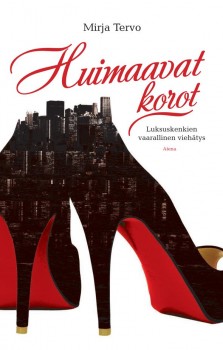 C’est moi. Tribute. Eliza. Muse. Monica. Very Privé, Super Private.
C’est moi. Tribute. Eliza. Muse. Monica. Very Privé, Super Private.
These are names of shoes that women buy in luxury shops on New York’s Fifth Avenue. Six inches or more of heels that cost anything between 500 and 5,000 dollars, make walking torture; but pain is tolerated, as along with the shoes a woman acquires a deeply satisfying feeling of being envied, beautiful and sexy (her toe cleavage has to be clearly visible).
Mirja Tervo (born 1971) is an ethnologist who spent a year and a half selling luxury shoes in Manhattan. Among her fellow sales personnel were a medical doctor, a musician, an actor and a retired baseball pro.
The shoe salon paid no salary, just commission of ten per cent, and the required minimum sale per week was 3,500 dollars. If a sales person failed to sell merchandise worth this sum, he or she was given a loan of 300 dollars, payable immediately when the results improved, and they quickly had to. More…
Nordic Drama Award for Heini Junkkaala
14 May 2010 | In the news
On May 7 playwright Heini Junkkaala (born 1975) received the bi-annual Nordic Drama Award (worth €5,000), presented by the Nordic Theatre Union.
Her play Kymmenen tikkua laudalla (‘Ten sticks on a board’, 2008) is a drama for children spanning three generations that contains both realistic and fantastic elements. Junkkaala’s latest play, Kristuksen morsian (‘Bride of Christ’), about religion and homosexuality, was premièred at the Finnish National Theatre in March.
The last two winners of the award were also Finns: Juha Jokela received it for his play Fundamentalisti (The Fundamentalist) in 2008, and Kari Hotakainen won the prize for his play Punahukka (Border Crossing) in 2006 (both have been translated into English; introductions in English are available here; click Translations of Finnish drama).
What Finland read in April
14 May 2010 | In the news
In April Sofi Oksanen’s best-selling novel Puhdistus, Purge (winner of the Finlandia Prize for Fiction in 2008, WSOY, and now available in English translation) was top of the best-selling Finnish fiction list again. Quite an achievement.
Finns seem to be besotted with Pertti Jarla’s comic books: three of them, set in the weird city of Fingerpori (‘Fingerborg’, Arktinen Banaani), were on the list.
The final volume of artist and writer Hannu Väisänen’s fictionalised autobiography, Kuperat ja koverat (‘Convex and concave’, Otava, 2009), was number five on the list. Number three was a newcomer, Tumman veden päällä (‘On dark water’, Tammi), also an autobiographical novel about childhood, by the the actor Peter Franzén.
Names appearing high on the foreign fiction list in April included Child Lee, Dan Brown, Falcones Ildefonso, Liza Marklund, Pamuk Orhan and W.G. Sebald.
Sirpa Kivilaakso: Satukuningatar Anni Swan [Anni Swan, the queen of storytelling]
7 May 2010 | Mini reviews, Reviews
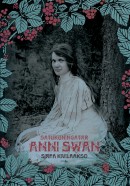 Satukuningatar Anni Swan. Elämä ja teokset
Satukuningatar Anni Swan. Elämä ja teokset
[Anni Swan, the queen of storytelling. Her life and works]
Jyväskylä: Atena, 2009. 275 p., ill.
ISBN 978-951-796-561-3
€ 32, hardback
Anni Swan (1875–1958) was a writer, translator and editor of children’s magazines. Her symbolic tales utilise her highly original language of sensory imagery. Swan’s symbolism is rooted in the golden age of Finnish arts at the end of the 19th century. The pre-eminent setting for Swan’s stories is the Finnish forest. Her ‘eco-criticism’ of practices that exploited the natural environment can be seen as radical for her time. Swan is also considered to be the first true writer of books for young people in Finland. Her stories about upper-class characters who overcome obstacles emphasise the class conflicts and other injustices of their day, yet they have remained popular into the 21st century. This book, based on Sirpa Kivilaakso’s doctoral thesis on Swan’s fairy-tale symbolism, presents a biography of the author, with supporting extracts from her books, diary entries and letters.
Markku Koski: ‘Hohto on mennyt herrana olemisesta’ [‘The glory has gone from being a VIP’]
7 May 2010 | Mini reviews, Reviews
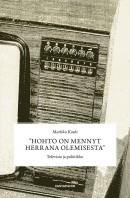 ‘Hohto on mennyt herrana olemisesta’ – Televisio ja poliitikko
‘Hohto on mennyt herrana olemisesta’ – Televisio ja poliitikko
[‘The glory has gone from being a VIP’ – the television and the politician]
Tampere: Vastapaino, 2010. 254 p.
ISBN 978-951-768-249-7
€ 29, paperback
This book, based on the author’s doctoral thesis in Media and Communication Studies at the University of Tampere, presented in February 2010, takes as its starting point Walter Benjamin’s well-known essay, ‘The Work of Art in the Age of Mechanical Reproduction’. Koski applies Benjamin’s ideas on cinema and film stars to contemporary television and politics. Koski maintains that while the public have become alienated from politics, politicians have also become alienated from themselves and have become reiterative entities whose essential content is repetition. After television and other new media have called into question traditional forms of politics, a significant challenge for politicians has been to prevent viewers from getting bored. Koski discusses relationship between politics and comedy, the ‘cynical’ viewer, the popular public image of Marshal Mannerheim (an iconic figure in Finnish history and politics) and the popularity of Sauli Niinistö, the frontrunner in the upcoming (2012) Finnish presidential election. Dr Koski also considers historical and contemporary image politicians in various other countries.
Literature international
7 May 2010 | In the news
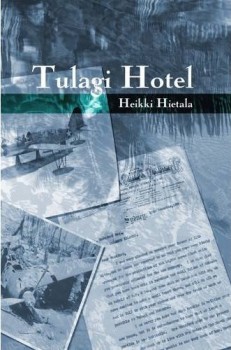 A novel set on the islands of the Pacific and Indian Oceans, Tulagi Hotel, was published by Dragon International Independent Arts (Diiarts) in London on 12 April. The writer is a native Finn, Heikki Hietala, who wrote his book in English.
A novel set on the islands of the Pacific and Indian Oceans, Tulagi Hotel, was published by Dragon International Independent Arts (Diiarts) in London on 12 April. The writer is a native Finn, Heikki Hietala, who wrote his book in English.
Hietala, a translator and lecturer at Haaga-Helia University of Applied Sciences in Helsinki, began writing his novel in 1996, and in 2008 a refined version was uploaded onto the HarperCollins website, Authonomy, where Tulagi Hotel rose to number 15 in the popularity ratings for novels – in a selection of some eight thousand. It is now available also in an electronic version for Kindle.
The story takes place in the years of the Second World War and after; a US Marine fighter pilot from the Midwest, Jack McGuire, settles down on the Solomon Islands and begins to run a hotel. The arrival of his wartime best friend’s widow, Kay Wheeler, disrupts his orderly civilian life.
We congratulate the author for his rare achievement – however, we’d like to point out a small error. Tulagi Hotel is advertised as ‘the first book written in English by a Finn to be published outside Finland’, this is not quite true, as Anselm Hollo, a native Finn, translator and poet living in Colorado, has been publishing poetry books in English in the UK and the US since the 1960s. (Here are samples of his poems:)
Prose prizes
7 May 2010 | In the news
This year’s Finnish Government Prizes for Literature and Translation have been awarded to, respectively, the writer and journalist (and former Editor-in-Chief of Books from Finland) Kristina Carlson (born 1949) and the translator Tarja Roinila (born 1964). The prizes, which are given on the recommendation of the Finnish National Council for Literature and are worth €15,000 each, were awarded at a ceremony in Helsinki on 4 May by the Minister of Culture and Sports, Stefan Wallin.
Carlson’s second novel, Herra Darwinin puutarhuri (‘Mr Darwin’s gardener’, Otava), published last autumn, is a taut, deep and rich story narrated by many voices, contrasting science and faith, solitude and community. ‘It is not often that a single work renews the novel form,’ remarked the jury. (We featured an interview with Carlson, as well as an extract from the novel here on the Books from Finland website last September.)
The translator Tarja Roinila has specialised in prose and poetry written in Spanish, French and German; her latest translations, of the linguistically complex novels of the Austrian author Thomas Bernhard, are extremely musical, the jury remarked.
On 4 May, which was celebrated in Finland as the Day of the Book and the Rose (this custom, which originally took place on St George’s Day, April 23, was born in Barcelona: originally men gave women roses, and received books in return), Kristina Carlson received the Kiitos kirjasta (‘Thanks for the book’) medal, awarded jointly by the Booksellers’ Association, the bookshop sales asistants’ association Libro and the Finnish Library Association.
Paris, je t’aime
7 May 2010 | This 'n' that
‘Paris traverse la pensée comme une encyclopédie de la vie, où l’on découvre des passages, des cours intérieures, des ruelles et des autoroutes, toujours plus surprenants. La ville ne se vide ni n’abandonne jamais, n’accorde ni ne refuse.’
‘Paris permeates your mind like an encyclopaedia of life in which you will incessantly discover astonishing new passages, courtyards, alleys and avenues. It will never either run empty or surrender, it won’t admit or refuse.’
L’air de Paris / Pariisin tuoksu (‘Air of Paris’, Musta Taide, 2009) is an elegant little book that features artwork by Ismo Kajander and texts by Anna Kortelainen relating to the mother city of all artists. More…

